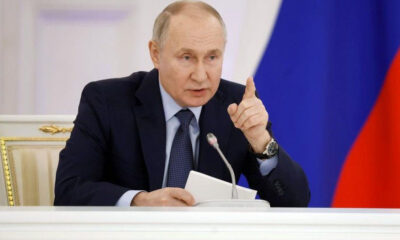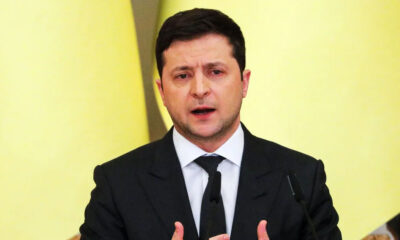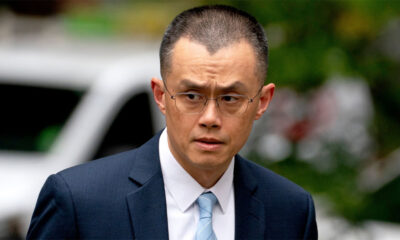International
Russia escalates false chemical weapons claims about US, Ukraine

Russia is doubling down on its false claims that the U.S. and Ukraine are developing chemical or biological weapons for use against invading Russian forces, bringing the accusation to the United Nations Security Council on Friday.
A web of disinformation, not only from Russian state media but also Chinese propaganda outlets and even some American voices, have increasingly spread the conspiracy theory this week.
That’s prompted heightened concern among U.S. and Ukrainian officials that Russia itself may be planning to deploy chemical or biological weapons against Ukrainian targets or as part of a so-called “false flag” operation.
“This makes me really worried because we’ve been repeatedly convinced if you want to know Russia’s plans, look at what Russia accuses others of,” Ukrainian President Volodymyr Zelenskyy said in a televised address late Thursday, a sentiment the White House first shared Wednesday.
Ukraine does not have biochemical weapons laboratories. Instead, there are public health and veterinary health labs operated with U.S. support in Ukraine and several other former Soviet countries that provide technical support to a government’s health ministry and study disease, like the U.S. Centers for Disease Control and Prevention.
READ ALSO:
- Russia strikes western Ukraine targets, renews push toward Kyiv
- Osinbajo, Atiku others grace installation of 42nd Olubadan
- (ICYMI) Lagos-Ibadan train runs out of diesel, stops midway, passengers complain + VIDEO
U.S. support originated with the Cooperative Threat Reduction program, launched in 1991 to help secure and dismantle the remnants of the former Soviet Union’s biochemical weapons program in newly independent states, including Ukraine.
The U.S. has talked openly about the program throughout its history, working with 26 facilities in Ukraine on issues like biosafety and scientific mentorship training, according to the Bulletin of Atomic Scientists, an independent nonprofit dedicated to science and global security.
But in recent years, Russia, as well as China, has escalated accusations that these labs constitute a secret U.S. biochemical weapons program, at one point even claiming in state-run media outlets that they created the COVID-19 pandemic. In bitter irony, these labs have helped detect and stop the spread of COVID-19, according to public health officials.
Those false claims have skyrocketed this week, with Russian now bringing them to one of the world’s brightest spotlights — the U.N. Security Council. Russia’s mission in New York called for an emergency meeting Friday, 24 hours after its defense ministry falsely claimed it uncovered “U.S. secret military biological projects in Ukraine,” per state-run media.
“We’re not going to let Russia get away with gaslighting the world or using the U.N. Security Council as a venue for promoting their disinformation,” Olivia Dalton, the spokesperson for the U.S. mission to the U.N., told ABC News Thursday.
It’s unclear if the U.S. will try to stop the meeting, currently scheduled for 10 a.m. ET. Procedural matters, like holding a meeting, require nine of the chamber’s 15 envoys to vote in favor, and no country can veto a meeting being held.
While the false claims have escalated this week, Russian Defense Minister Sergei Shoigu ranted back in December that Ukraine, with U.S. mercenary help, was preparing a chemical weapons attack.
In 2018, Russia also made similar accusations against Georgia, the small former Soviet state that the Kremlin invaded a decade earlier as its government, like Ukraine’s, sought NATO membership. Russian forces still occupy two regions of the country, recognizing them as independent states — just as it did last month in eastern Ukraine before launching its invasion.
“The Russian allegations appear to be part of a disinformation campaign that has grown in response to scrutiny of Moscow for using and enabling the use of chemical weapons,” the Bulletin of Atomic Scientists reported in 2018 when Russia’s claims about Georgia were proven false.
The Kremlin record of “using and enabling the use of chemical weapons” runs deep, according to the Bulletin of Atomic Scientists, especially against individuals deemed enemies.
READ ALSO:
- NDLEA intercepts 3m opioid caps, 8,613kg of Loud at Lagos terminal, Eko beach
- [Breaking] Bamise murder: Court remands BRT driver for 30 days
- Arrested Lagos BRT driver raped me inside bus, says victim, presents evidence
No one is higher on that list right now than Alexey Navalny. The opposition leader and anti-corruption activist was poisoned in August 2020 with the nerve agent Novichok by agents from the FSB, Russia’s principal security agency. He was flown to Germany and recovered before returning in January 2021 to Moscow, where he was almost immediately arrested.
Another notable example before Navalny were the Skripals. Sergei Skripal, a former Russian officer who was a double agent for the United Kingdom, was also poisoned with Novichok in March 2018 in Salisbury, England. His daughter Yulia and a police officer were also hospitalized by the attack, but all three recovered.
In contrast, Ukraine has been in full compliance with the chemical and biological weapons conventions since signing them in 1972 and 1993, respectively, according to the State Department.
Asked about Ukraine’s biomedical facilities, CIA Director Bill Burns told the Senate Thursday, “In any public health system around the world, there’s going to be work done in the interests of wider public health, to ensure that we have a grip on issues like that. But that’s in no way threatening. That’s not something that can be weaponized in the way that the Russians have clearly demonstrated — by their own actions against their citizens and people outside their country — their willingness to use.”
It’s unclear whether U.S. intelligence has any evidence that Russian forces are preparing for a chemical or biological attack. The White House, State Department and Pentagon publicly pointed only to “Moscow’s track record” and “increasingly concerning rhetoric,” in the words of State Department spokesperson Ned Price.
But a senior Pentagon official told reporters, “We have picked up indications that the Russians could be making these claims — these false claims — about us and Ukrainian work in bio defense as a way of creating a pretext of their own, to perhaps use these kinds of agents in an attack.”
Pressed on what “indications” they were referring to, they added, “I have to leave it with you with indications, and [I’m] not going to be at liberty to go in more detail than that today.”
For those in Ukraine, where Russian forces have shown there’s little they won’t do to subjugate the country, the fear is real.
“The manic obsession with which various Russian officials fantasize about non-existent biological or chemical weapons or hazards in Ukraine is deeply troubling and may actually point at Russia preparing another horrific false flag operation. This tweet is for the record,” Ukrainian Foreign Ministry Dmytro Kuleba tweeted Thursday.
ABC News’ Luis Martinez contributed to this report from the Pentagon.
International
Israel seizes key Gaza border, launches assault on Rafah
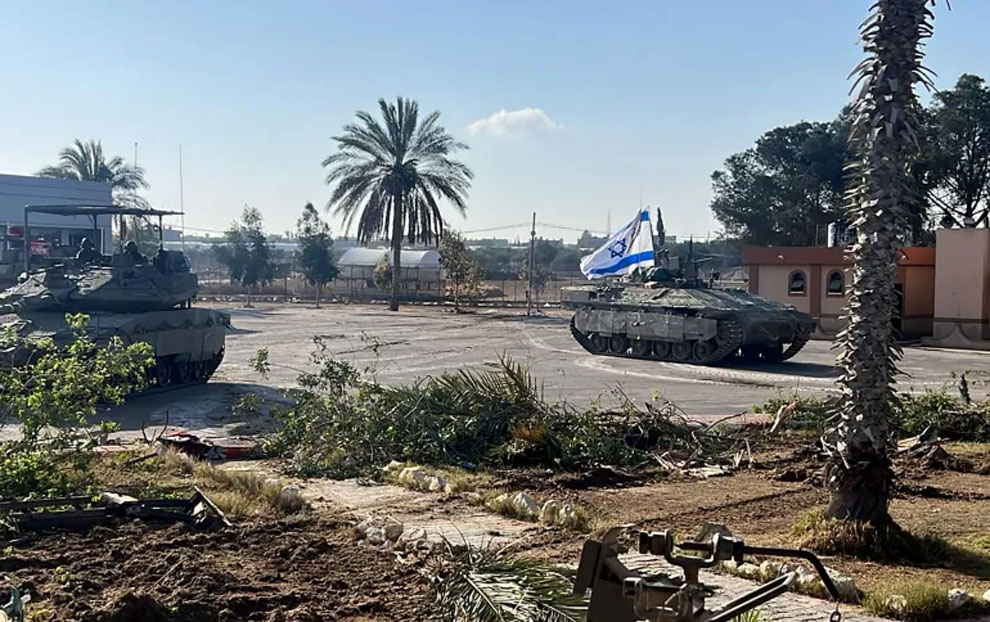
Israel seizes key Gaza border, launches assault on Rafah
Israeli forces have seized control of Gaza’s Rafah border crossing, cutting off a vital route for humanitarian aid and potential sanctuary for civilians from a building offensive.
The Israeli military said on Tuesday that it had seized “operational control” of the Gaza side of the border post, which links the besieged enclave with Egypt. The closure of the crucial passage and positioning of tanks in the centre of Rafah is seen as a demonstration of Israel’s determination to press on with an assault on the southern city despite ongoing truce talks.
The 401st Brigade entered the Rafah crossing early on Tuesday, the Israeli military said, closing a route vital for the aid entering Gaza and any civilians able to flee the fighting to Egypt.
The military claimed that the crossing was “being used for terrorist purposes”, alleging that Hamas’s mortar attack on Sunday on the Karem Abu Salem crossing, known as Kerem Shalom to Israelis, which remains closed, was launched from the vicinity. However, it has not so far provided evidence.
The operation came amid an overnight assault on eastern parts of the city. Warplanes pounded residential homes, killing at least 12 people.
Israel’s military said in a statement it had struck numerous Hamas targets in eastern Rafah, killing about 20 fighters.
A spokesman for the Palestinian Crossings Authority acknowledged to The Associated Press news agency that Israeli forces had seized the crossing and closed it for the time being.
READ ALSO:
- US, UK, most EU nations to boycott Putin inauguration
- Why Atiku is afraid of the coastal highway project success – Presidency
- Depressed Delta lady kills self over hardship
“It’s been a very difficult night,” reported Al Jazeera’s Hani Mahmoud from Rafah. “It’s been very violent, very bloody and full of destruction.”
The assault comes despite Hamas having said on Monday that it had agreed with the terms of a truce deal hammered out by mediators.
However, pressed by hardline nationalist coalition partners who have demanded a full offensive on Rafah, Israeli Prime Minister Benjamin Netanyahu appears set to press on regardless.
Trapped
Tareq Abu Azzoum reported from Rafah that the Israeli military carried out an incursion on the eastern side of Rafah, during which there was a heavy exchange of fire with Hamas fighters amid an intense bombing campaign, with the main objective of seizing control of the crossing.
The Israeli control of the border post “is devastating because … Palestinians will no longer be able to leave the territory”, he said.
Despite urgent warnings from its closest allies that an offensive on the city risks huge numbers of civilian casualties, Israel insists that its plans will allow it to clear Rafah and press on to attack the Hamas command and fighters there.
“The Rafah offensive has started again, in spite of all the requests of the international community, the US, the European Union member states, everybody asking Netanyahu not to attack,” Josep Borrell, the EU’s top diplomat, told journalists on Tuesday. “I am afraid that this is going to cause again a lot of casualties, civilian casualties. Whatever they say,” he said, adding, “there are no safe zones in Gaza.”
READ ALSO:
- CBN directs banks to start deducting cybersecurity levies from customers
- Olise scores twice as Crystal Palace trash Manchester United
- Many injured as Police teargas Delta protesters
Israeli forces whipped up panic on Monday as they ordered 1.4 million or so Palestinians in Rafah – most of whom are displaced following previous instructions from the Israeli military – to evacuate.
The Israeli army reiterated on Tuesday that it has “encouraged” displaced people and international humanitarian organisations operating in eastern Rafah to “temporarily evacuate”.
However, people sheltering in Rafah, amid poor conditions with little shelter, food, or medicine, have few places to go.
The closure of the border crossing only threatens to worsen those shortages and trap more people close to the fighting.
Sources from three humanitarian relief agencies told the Reuters news agency that aid shipments had been halted due to the closure of the crossing.
The latest Israeli operation sees them being pushed towards al-Mawasi on the coast, where the military says it has set up field hospitals, tents, and medical supplies.
“The Israeli military is … strategically cutting off the Gaza Strip and sealing it off from the region,” suggested Al Jazeera’s Mahmoud.
“With the Israeli military presence there right now, we can safely say that we’re looking at a very difficult situation in terms of getting humanitarian aid into Gaza,” he said.
“At the same time, when we look at the location of the Rafah crossing, at almost the centre of the city, that indicates that we’re very close to a full invasion of Rafah.”
Israel seizes key Gaza border, launches assault on Rafah
International
US, UK, most EU nations to boycott Putin inauguration

US, UK, most EU nations to boycott Putin inauguration
The United States and most European Union nations have said they will not send envoys to Tuesday’s inauguration of Vladimir Putin as Russian president.
Putin, 71, secured a fifth term in office in a March election that critics said lacked democratic legitimacy.
He gained 87.28 percent of the vote, weeks after the sudden death of his most vocal critic, Alexey Navalny, in an Arctic prison.
“We will not have a representative at his inauguration,” US State Department spokesperson Matthew Miller told reporters. “We certainly did not consider that election free and fair but he is the president of Russia and he is going to continue in that capacity.”
The United Kingdom and Canada said they would not send anyone to the ceremony, while a spokesperson for the European Union told the Reuters news agency the bloc’s ambassador to Russia would not attend the inauguration, in keeping with the position of most of the EU’s member states.
The three Baltic states – Estonia, Latvia and Lithuania – which have withdrawn their ambassadors from Moscow – ruled out attending the inauguration.
“We believe that the isolation of Russia, and especially of its criminal leader, must be continued,” Lithuania’s Foreign Minister Gabrielius Landsbergis said.
READ ALSO:
- Why Atiku is afraid of the coastal highway project success – Presidency
- Depressed Delta lady kills self over hardship
- CBN directs banks to start deducting cybersecurity levies from customers
“Participation in Putin’s inauguration is not acceptable for Lithuania. Our priority remains support for Ukraine and its people fighting against Russian aggression.”
The Czech Republic is also expected to snub the ceremony, while Germany’s Foreign Office said its representative would not attend – it earlier recalled its ambassador over alleged Russian cyberattacks.
An aide to Putin said the heads of all foreign diplomatic missions in Moscow including those from “unfriendly states” had been invited to attend the inauguration, which starts at noon (09:00 GMT) and will be broadcast live on Russian television.
Putin is due to arrive in a luxury motorcade – state-run RT reported modifications to his armoured Aurus limousine including improved sound insulation and all-round cameras – at the Grand Kremlin Palace. The one-time KGB spy will then walk through the palace corridors to the ornate Saint Andrew Hall, where he will take the presidential oath and make a brief address. He will also received a blessing from the patriarch of the Russian Orthodox Church.
The ceremony is taking place a day after Russia announced plans for a tactical nuclear weapons drill, blaming what it said were “provocative” moves by Western countries over Ukraine. Putin launched his full-scale invasion of Ukraine more than two years ago.
“Ukraine sees no legal grounds for recognising him as the democratically elected and legitimate president of the Russian Federation,” Ukraine’s Ministry of Foreign Affairs said in a statement.
Tuesday’s swearing-in ceremony, it said, sought to create “the illusion of legality for the nearly lifelong stay in power of a person who has turned the Russian Federation into an aggressor state and the ruling regime into a dictatorship”.
Despite the apparent boycotts, France, Hungary and Slovakia are all expected to send representatives to the ceremony, Reuters reported, citing unnamed diplomatic sources.
Speaking alongside China’s president on Monday, French President Emmanuel Macron said: “We are not at war with Russia or the Russian people, and we have no desire for regime change in Moscow.”
The source said France had previously condemned the context of repression in which the election was held, depriving voters of a real choice, as well as the organisation of elections in Ukrainian territories occupied by Russia, which France considers a violation of international law and the United Nations Charter.
Franco-Russian relations have deteriorated in recent months as Paris has increased its support for Ukraine.
Last week, Macron said it would be legitimate for France to send troops to Ukraine if Russia broke through the Ukrainian front lines and Kyiv requested assistance.
US, UK, most EU nations to boycott Putin inauguration
International
Chinese state linked to hacking of UK Defence Ministry
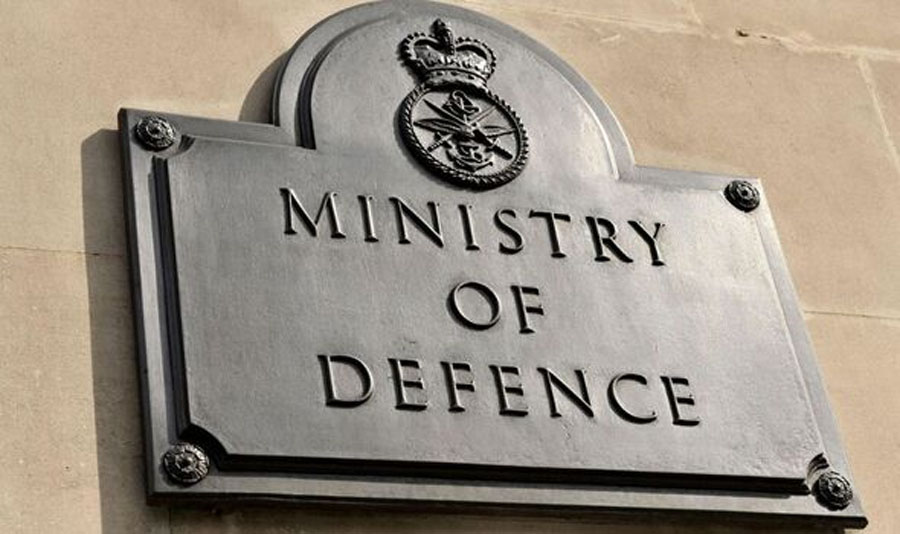
Chinese state linked to hacking of UK Defence Ministry
Sky News has learned of a significant data breach at the Ministry of Defence (MoD), with indications pointing towards state-sponsored hacking by China. The breach targeted service personnel, prompting concerns about national security and individual safety.
According to sources, the cyberattack, allegedly orchestrated by the Chinese state, targeted the MoD’s payroll system, compromising the personal information, including names and bank details, of both current service personnel and veterans. While all salaries for this month will be disbursed as planned, the breach raises serious concerns about the vulnerability of sensitive government systems.
Conservative MP Tobias Ellwood, a former soldier, expressed suspicions that China may exploit the financial vulnerability of affected individuals for coercive purposes. Defence Secretary Grant Shapps is expected to address the issue in Parliament, outlining measures to safeguard affected personnel and mitigate future risks.
READ ALSO:
- Terrorists attack Southern Kaduna again, kill six, injure eight
- Court rules against wife who sued husband for forced ‘unnatural sex’
- Netanyahu rubbishes Hamas ceasefire proposal
The MoD has moved swiftly to investigate the breach, assuring that no data appears to have been extracted thus far. However, the incident underscores the evolving nature of cyber threats and the imperative of bolstering national defenses in the digital realm.
The breach comes amid escalating tensions between the UK and China, with recent accusations of cyber aggression attributed to “state-affiliated actors.” Labour’s shadow defence secretary, John Healey, has called for a comprehensive response from the government, emphasizing the gravity of the breach and its implications for national security.
Conservative MP Sir Iain Duncan Smith echoed concerns about China’s systemic threat, calling for a recalibration of UK policy in response to Beijing’s hostile activities. The incident underscores the need for heightened vigilance and investment in cybersecurity infrastructure, as advanced warfare increasingly extends into the digital domain.
Chinese state linked to hacking of UK Defence Ministry
-

 metro2 days ago
metro2 days agoDSS seals Plateau clinic over patient’s death
-
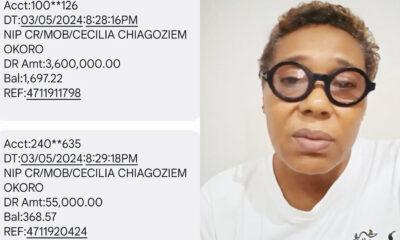
 Entertainment3 days ago
Entertainment3 days agoNollywood veteran Shan George weeps as fraudster clears ₦3.6m from her account (VIDEO)
-

 International3 days ago
International3 days agoGaza: Thousands rally for hostage deal as ceasefire talks continue
-

 Sports3 days ago
Sports3 days agoRonaldo’s hat-trick leads Al Nassr to 6-0 victory over Al Wehda
-

 metro2 days ago
metro2 days agoWe’ve arrested seven suspected cultists, armed robbers in Anambra – Police
-

 Politics2 days ago
Politics2 days agoPDP: Sule Lamido blames court for mass resignation from party
-

 Opinion3 days ago
Opinion3 days agoWho has bewitched our beloved America? – Femi Fani-Kayode
-
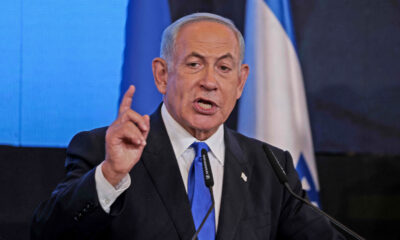
 International17 hours ago
International17 hours agoNetanyahu rubbishes Hamas ceasefire proposal

